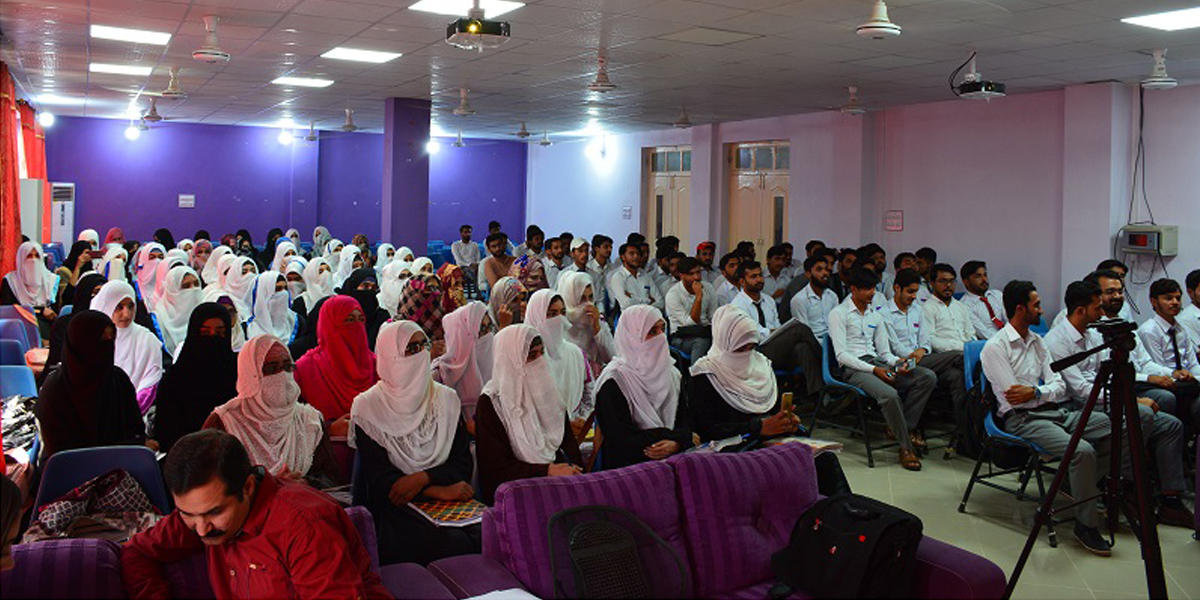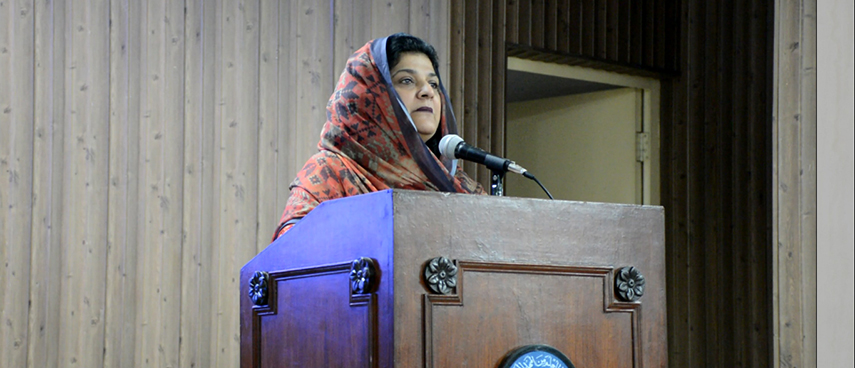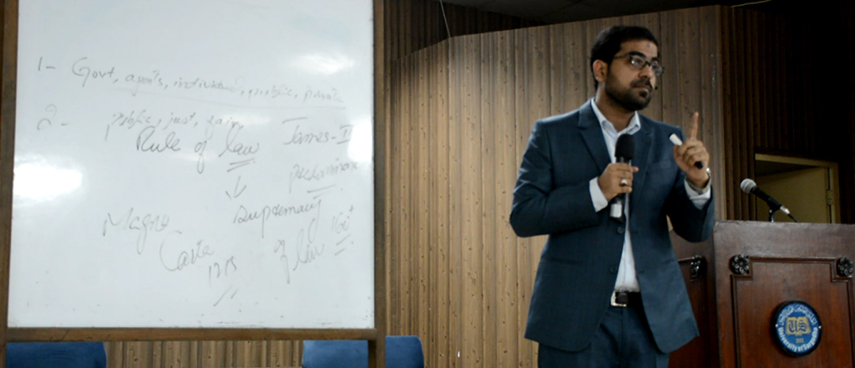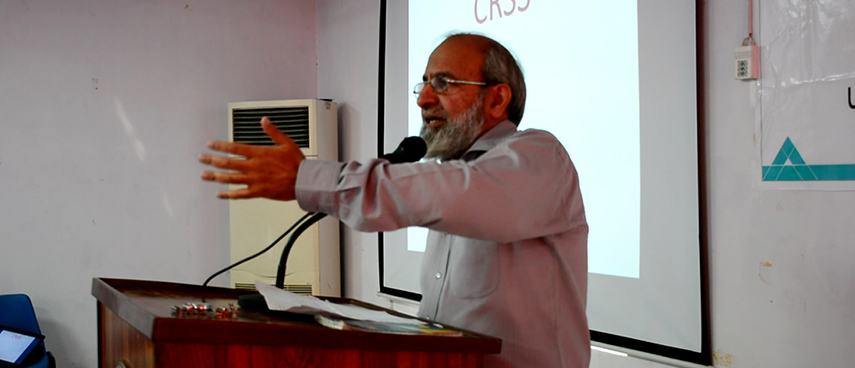The Center for Research and Security Studies (CRSS) conducted the eighth two-day PACE Collaborative workshops and debates for university students, on October 1-2, 2019, in Sargodha. The workshop was held at University of Sargodha, Sargodha. It was organized under the umbrella of the Pakistan Center of Excellence (PACE), a counter-radicalization and pluralistic values’ focused project, in collaboration with the Dutch Government.
Participants included students from University of Sargodha. Dr. Ashfaq Ahmed started off the workshop with a welcome note to all the participants including students and faculty members. Dr. Ahmed extended his gratitude to CRSS for organizing PACE collaborative workshop at their university to engage with the students in impactful sessions and activities. In his opening remarks, Dr. Ashfaq stressed on the need of conducting seminars on equality, diversity and tolerance, to make the younger generations understand the values of inclusive societies.
During her introductory remarks, Ms. Shagufta Khalique, Program Consultant CRSS, said that PACE is a counter radicalization initiative by CRSS which was started in September, 2015 and completed its first phase in September, 2018. The core objective of PACE is to indoctrinate the tradition of questioning and critical thinking among the youth of Pakistan. She added that the purpose of such activities is to bring together the youth at one platform and discuss about critical issues of multiculturalism, diversity, democracy and accountability.
Ms. Farhana Kanwal. Program Manager PACE, elaborated on the success and achievements of PACE in its first phase and also the objectives of PACE evolution.
The first formal session of the day was kicked off by Ms. Shagufta Khalique on ‘Fundamental Human Rights’. During her session, Ms. Khalique, thoroughly discussed about Universal Declaration of Human Right (UDHR) connecting it with fundamental rights enshrined in the Constitution of Pakistan of 1973. She said that both UDHR and the Constitution ensure equal rights for everyone without any discrimination. She specially focused on Article 25 (A) which says that all the citizens of Pakistan are equal in their status and no one can be discriminated against their religion, culture, ethnicity, language, and gender.
Ms. Shagufta Khalique had her second session on ‘Equality, Diversity and Tolerance.’ The session started with a group activity to find out similarities and differences among themselves which concluded as diversity is all about understanding differences and respecting perspectives. Ms. Khalique added that diversity makes one look unique and different than others and being different is beautiful. Every individual has a different personality which should be respected and celebrated because of its uniqueness. Differences can only be respected if we start listening to each other and understand perspectives.
Mr. Tauseef Hassan, Assistant Commissioner Khushab was the second speaker to the day who spoke on rule of law. During an interactive session with students, Mr. Hassan expressed his views saying that rule of law is directly linked to understanding of responsibilities as a citizen of Pakistan. Rule of law is all about apprehension of duties and responsibilities. He added that people usually break rule because they don’t like to be told what to do and it goes against their ego accept a set of rules made for them. He indicated that it is negative behaviour with no understanding of civic sense. In a country, rule of law can only be ensured if police and citizens work together to ensure rule of law. Each one of us has a responsibility to abide by traffic rules, but we don’t; however, as soon as we land in another country with strict rule of law, we become responsible. Not because, we respect laws but because there are strict penalties against such crimes which challenge law of the land. Without public cooperation, no government can implement laws. Everyone is equal in the eyes of law, no one is above its jurisdiction. Ensuring the rule of law is a collective responsibility of public and both and together we can lead to a law abiding society. Sharing the responsibility is the basic rule of citizenship.
On second day, Dr. Khalid Zaheer spoke on ‘Religious Freedom, Fundamental Rights and Social Inclusion.’ Dr. Khalid Zaheer is a renowned religious scholar and an expert on religious teachings and interpretation. Dr. Zaheer explained the concepts of religious freedom and social inclusion with reference to Quranic verses. Our religion strongly advocates religious freedom and doesn’t like imposition of beliefs and ideas on others, he remarked. He said that the Holy Quran is internally consistent and there is no contradiction in it. However, some of the verses are interpreted differently to create chaos, and sometimes for personal gains by some religious scholars. Allah describes humans as sons and daughters of Adam and Eve, to bring them all in an equal position; despite being their religion, race, ethnicity, language, culture and gender difference. Islam gives equal rights to all without any discrimination and whoever discriminates is going against its teachings.
He said that religious tolerance is a right everyone should give to others, to believe in and practice faith of their choice. Fundamental human rights, a guarantee in Islam and the last sermon of our Holy Prophet (PBUH) gives an elaborative explanation of it. The sermon is the best example of inclusion by ensuring the rights of all marginalized groups.
Ms. Farhana Kanwal closed the session with highlighting the importance of debates and critical thinking. She said that debate is a way of identifying and discussing the issues with logic and reason. She further said that an ideal society would always look beyond differences and there will be respect of rights and opinions for all, with no discrimination. Ms. Kanwal also thanked the participating universities and students for their support and encouragement throughout the seminar.v




